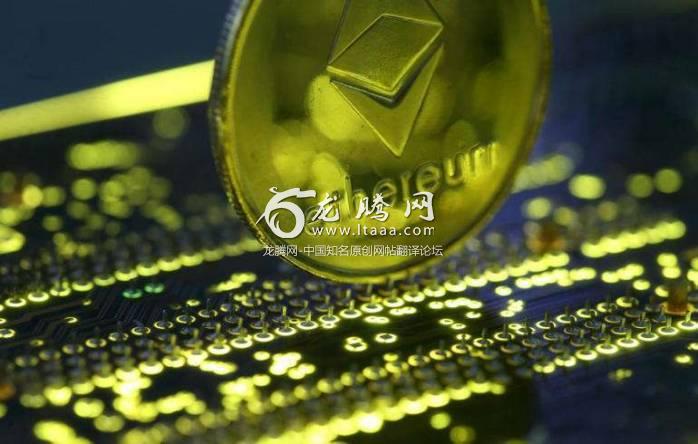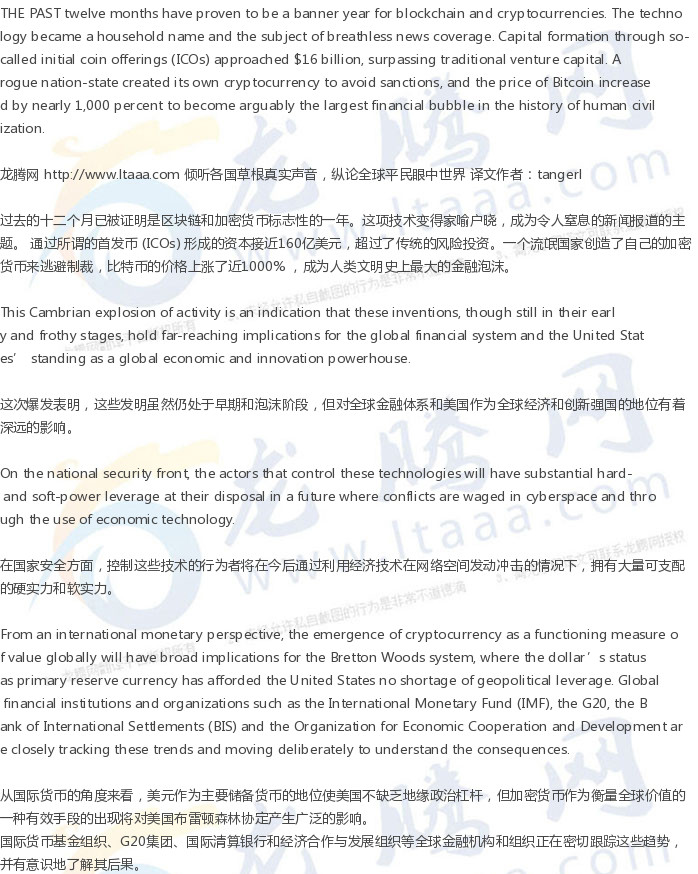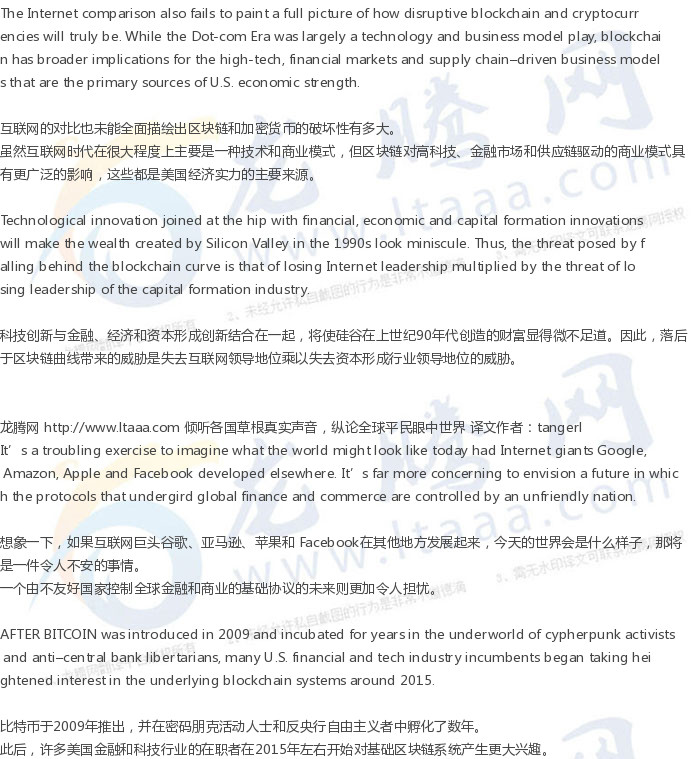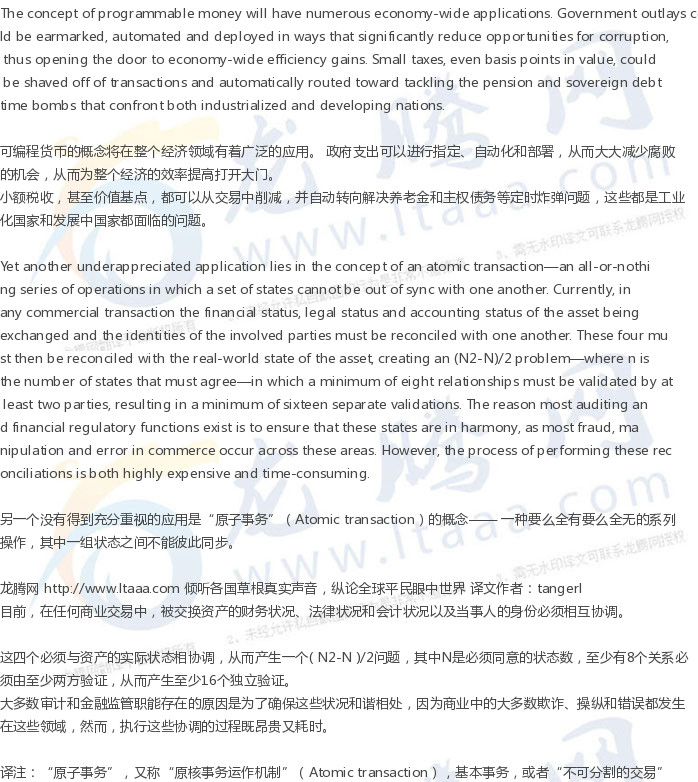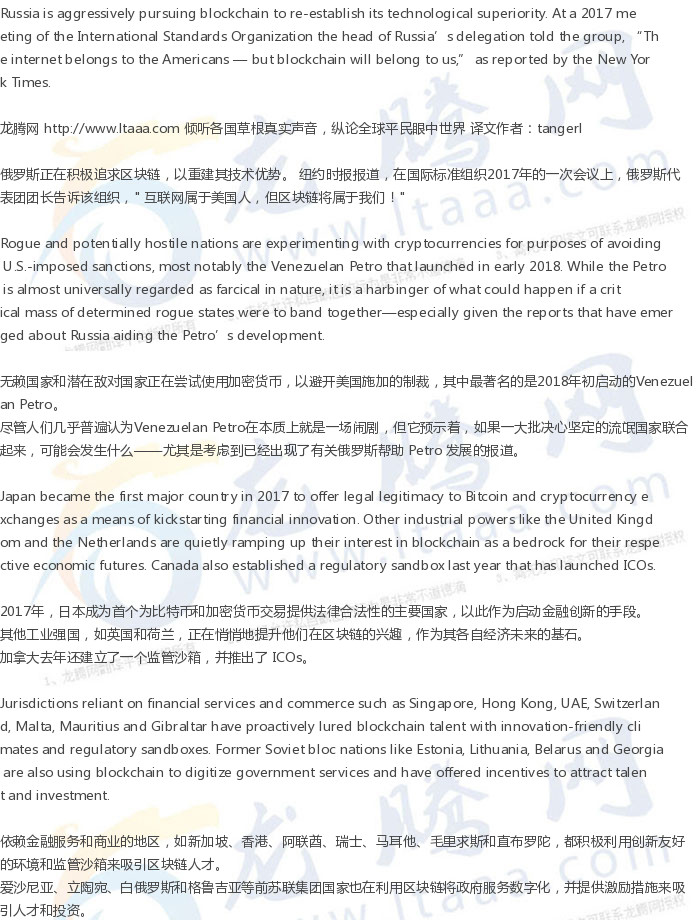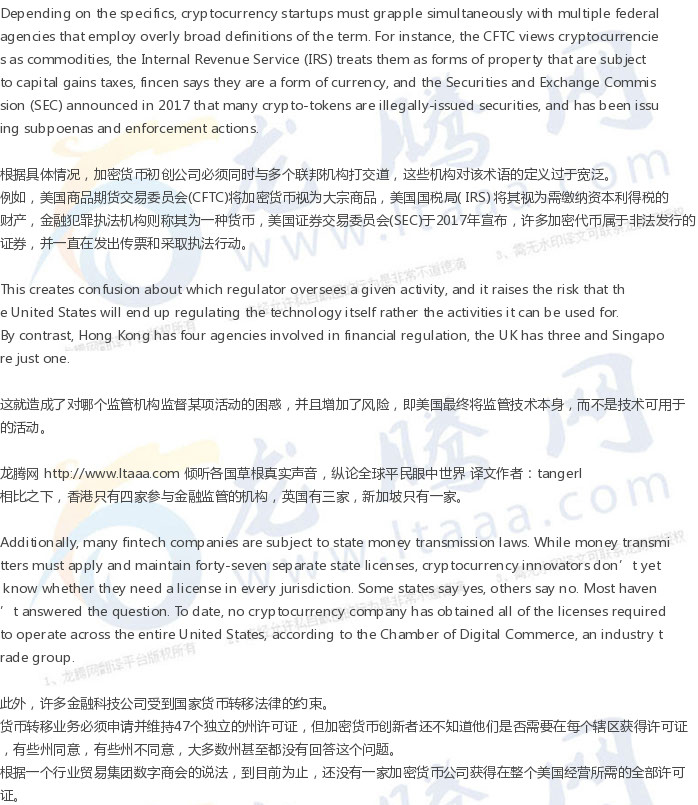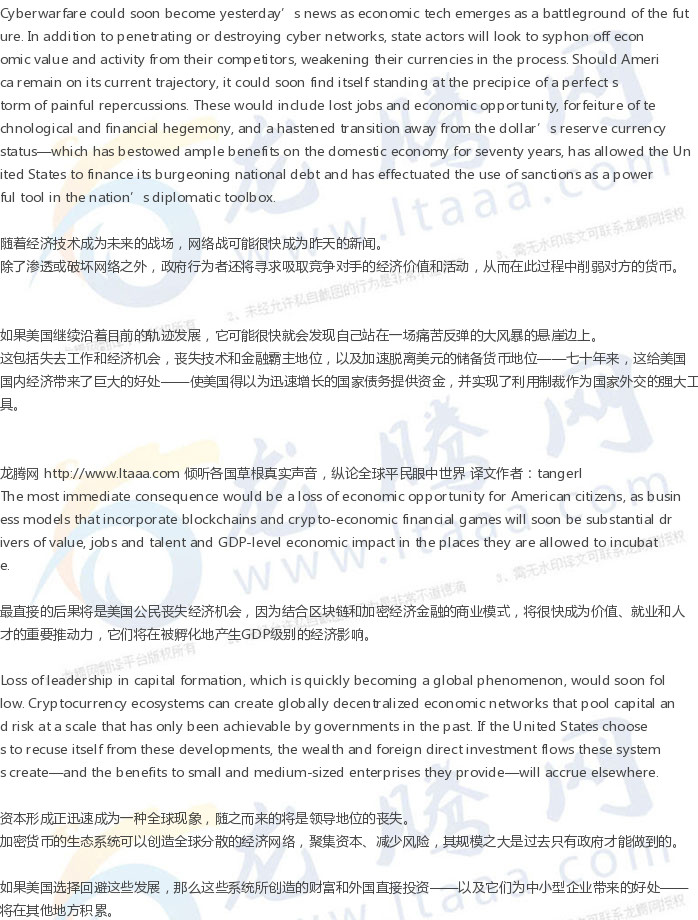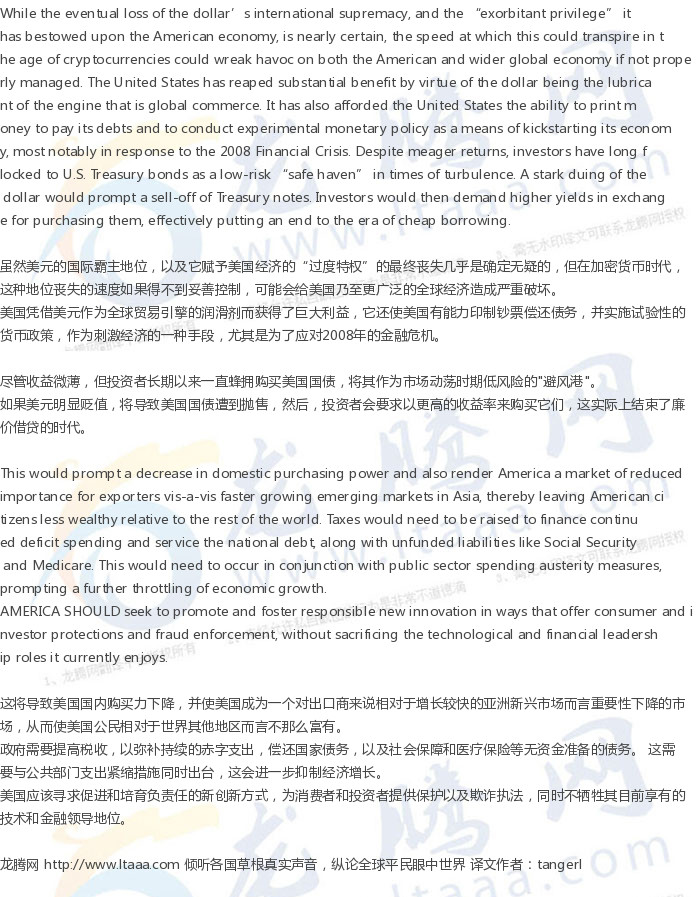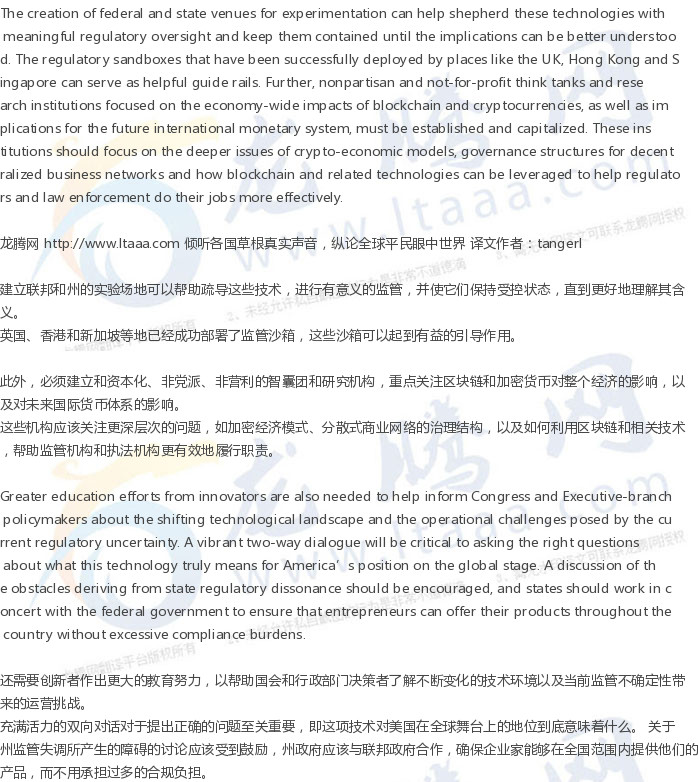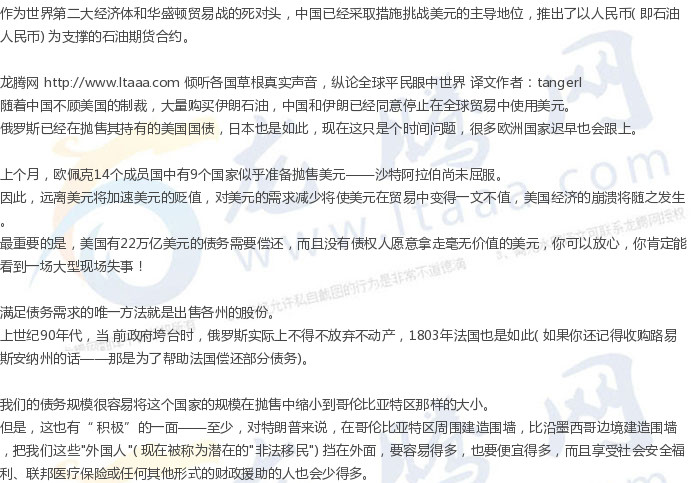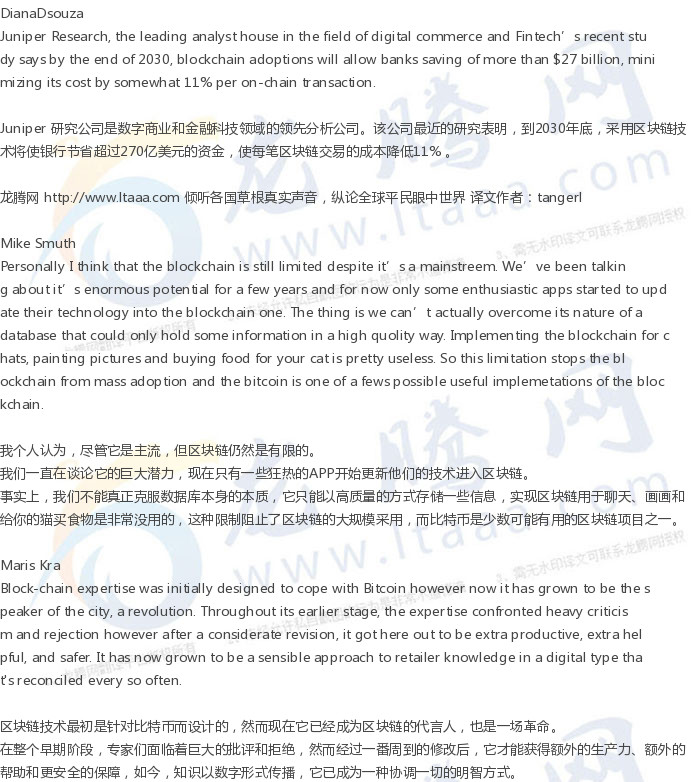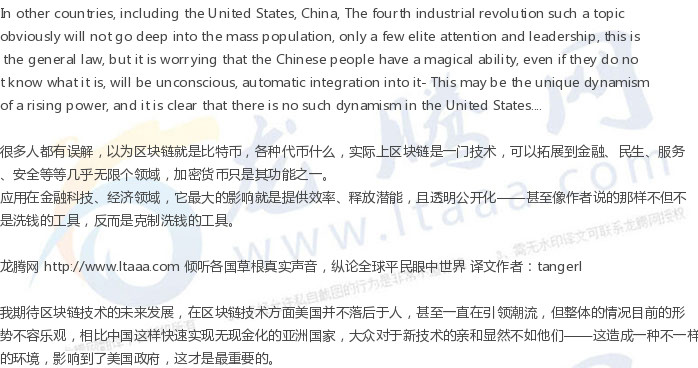区块链:为什么美国技术和金融优势处于危险之中 [美国媒体]
从全球货币的角度来看,加密货币作为一种有效的全球价值衡量标准的出现,将对布雷顿森林体系产生广泛的影响。
Blockchain: Why U.S Technological and Financial Dominance is at Stake
《 区块链:为什么美国技术和金融优势处于危险之中 》
From a global monetary perspective, the emergence of cryptocurrency as a functioning measure of value globally will have broad implications for the Bretton Woods system.
从全球货币的角度来看,加密货币作为一种有效的全球价值衡量标准的出现,将对布雷顿森林体系产生广泛的影响。
by Scott Nelson
Scott Nelson is CEO of Sweetbridge, an Arizona-based startup that is building blockchain-based protocols for commerce. Previously, he founded and led Trax Technologies, a global SaaS and supply chain services firm.
作者:斯科特·纳尔逊
作者简介:斯科特·纳尔逊是总部位于亚利桑那州的初创公司 SweetBridge 的CEO,该公司正在构建基于区块链的商业协议,此前,他创立并领导了全球SaaS和供应链服务公司 Trax technologies .
Competitor nations are also keenly monitoring these developments, eyeing an enhanced role for themselves on the global stage and investing in their own proprietary versions of the technology. China, for instance, is investing billions of dollars into blockchain development and leads the world in blockchain patent filings. Russia has been quite candid in that it sees blockchain as a means of dethroning the United States from its financial and economic pedestal.
竞争对手国家也在密切关注这些发展,着眼于在全球舞台上提升自己的地位,并投资于自己专有的技术版本。
例如,中国正在投资数十亿美元开发区块链,并在区块链专利申请方面领先世界。俄罗斯则非常坦率地承认,它视区块链为一种推翻美国金融和经济基座的手段。
WHAT'S DEFINITE is that a new digital monetary era is on the horizon; what’s uncertain is what role America will play in this system.
确定的说,一个新的数字货币时代即将到来,不确定的是,美国将在这个体系中扮演什么角色。
Such comments have obfuscated the role that crypto-tokens will soon play in economic activity and the true potential these systems offer—particularly in conjunction with other emerging technologies like artificial intelligence, the Internet of Things and robotic process automation. They also take for granted the question of the United States’ status as a leader in innovation, and fail to consider the steps it must take to spearhead the next technological revolution in the same way it led the last one.
这些评论混淆了加密令牌不久将在经济活动中扮演的角色,以及这些系统所提供的真正潜力——尤其是与人工智能、物联网和机器人过程自动化等新兴技术结合在一起时。
他们还认为美国作为创新领袖的地位是理所当然的,没有去考虑像引领上一次革命一样,美国必须采取何种步骤来引领下一次技术革命。
At the crux of the problem is a regulatory logjam that applies yesterday’s rules to tomorrow’s economy. Numerous federal agencies have asserted jurisdiction over cryptocurrencies and issued confusing and even contradictory regulatory guidance, bogging innovators down with compliance costs and legal risk. States individually have their own diverse rules and regulations governing securities and money service businesses, complicating matters even further.
问题的症结在于,将昨日的规则应用于明日经济的监管僵局。
许多联邦机构宣称对加密货币拥有管辖权,并发布了混乱甚至矛盾的监管指导,使创新者陷入合规成本和法律风险之中,各州对证券和货币服务业务有各自不同的规则和条例,使问题进一步复杂化。
Such labyrinthine and non-malleable structures are a liability in a rapidly evolving state of play. In a 2016 essay about the onsetting Fourth Industrial Revolution, Klaus Schwab, founder and executive chairman of the World Economic Forum, argued that the ability of governmental systems to be nimble and adapt in the face of new technologies that redistribute and decentralize power will ultimately determine their survival.
这样的迷宫式和非延展式的结构是快速演变状态下的一个不利因素。
世界经济论坛创始人兼执行主席克劳斯施瓦布(Klaus Schwab) 在2016年发表了一篇关于第四次工业革命前景的文章中指出,政府系统在面对新技术重新分配和分权时,能否灵活适应,最终将决定他们的生存。
COMPARISONS OF the current blockchain boom to the Internet craze of the 1990s are frequently and appropriately made, as both periods have been characterized by rapid technological disruption and new forms of wealth creation. However, the reality is that the current pace of technological change far surpasses anything witnessed two decades ago. This heightened pace of change is attributable to the Internet’s maturity as a global communication platform—allowing for instantaneous collaboration, criticism and feedback loops.
将当前的区块链热潮与20世纪90年代的互联网热潮进行比较是经常而恰当的,因为这两个时期都经历了技术的快速颠覆和新形式的财富创造。
然而,现实情况是,目前技术变革的速度远远超过20年前的任何事情。
这种加快的变化速度归功于互联网作为全球交流平台的成熟,它允许即时协作、批评和反馈循环。
Further, enormous sums of money are being thrown directly at technologists who don’t have traditional boards, management structures or investors attaching strings to those funds.
此外,巨额资金正直接投向那些没有传统董事会、管理结构或投资者对这些基金施加附加条件的技术人员。
In 2017, an estimated $6.5 billion was raised through ICOs, whereby a startup funds itself by issuing a native cryptocurrency for use in its platform rather than equity. This trend has showed no signs of slowing down in 2018, with $9 billion being raised via ICOs through June, according to Autonomous NEXT, an industry research group. This activity comes against a backdrop of a marked slowdown in companies undertaking traditional initial public offerings, with the number of public companies in the United States now just half of what it was twenty years ago.
2017年,ICOs 融资约65亿美元,创业公司通过发行本地加密货币为自己的平台融资,而非股权融资。
这一趋势在2018年没有放缓的迹象,根据一个行业研究小组 " Autonomous NEXT " 的数据,到今年6月份,ICOs 项目将募集90亿美元,这种活动的背景是承接传统首次公开募股(IPO)的公司数量明显减少,目前美国上市公司的数量只有20年前的一半。
To counter negative perceptions of Bitcoin, these incumbents began marketing a sanitized “blockchain, not Bitcoin” pitch that touts the technology, sans the cryptocurrency component, as a new type of database called “distributed ledger technology.”
为了应对人们对比特币的负面看法,这些现有的比特币公司开始推销一种经过净化的“ 区块链,而不是比特币”的说辞,将这种技术作为一种名为“分布式账本技术”的新型数据库来兜售,不使用加密货币组件。
While blockchain does have unique records management functionalities through its ability to seamlessly transfer value and achieve consensus among disparate parties that may not trust one another, the technology’s true value proposition has been overlooked: the ability to create programmable digital money that is governed by rules codified at the protocol level. This has led to the creation of economic ‘games’ in which the parties that play the game correctly and most effectively receive a financial reward that is significant enough to make playing by the rules more economical than trying to cheat.
虽然区块链确实有其独特的记录管理功能,通过它能够无缝转移价值,并实现不同的、可能彼此不信任的当事人之间的共识,但该技术的真正价值主张已被忽视::
区块链能够创造可编程的数字货币,并受协议级别规则的约束。
这导致了经济"游戏"的产生,在这种游戏中,正确且最有效地玩游戏的一方会获得了足够大的经济回报,这使得遵守游戏规则比试图进行欺骗更经济。
Take Bitcoin. A disparate network of global players spends billions of dollars on computing power annually and consumes as much electricity as the nation of Switzerland, all in a race to be the first player to verify the transactions processed over the Bitcoin network—a process known as ‘mining.’ The winner earns a reward denominated in a ‘currency’ that exists only in cyberspace, yet today has a market capitalization in excess of $100 billion despite having no intrinsic value and no centralized authority ensuring proper conduct.
以比特币为例。
一个由不同的全球参与者组成的网络每年在计算能力上花费数十亿美元,消耗的电力相当于瑞士的总和,所有这些参与者都希望成为第一个通过比特币网络验证并进行的交易的玩家——这个过程被称为"挖矿"。
获胜者获得的奖励以一种只存在于网络空间的货币计价,然而今天其市值超过1000亿美元,尽管没有内在价值,也没有中央集权来确保正确的行为。
另外,如果技术人员继续逃离美国,寻求更友好的监管环境,美国当局将发现自己只能听任外国管辖当局的摆布,而这些司法管辖区的反洗钱法规要宽松得多——2018年6月的国会听证会上,Fincen(金融犯罪执法网)对这一挑战表示了担忧。
Further, the nations that embrace blockchain and cryptoeconomics are priming themselves for significant economic breakthroughs. Price-stable cryptocurrencies that function as cash equivalents will significantly lower the cost of cross-border transactions and settlement, while providing businesses, consumers and governments a low-cost means of monetizing traditionally illiquid assets. These systems are creating new means by which businesses and governments can raise capital without issuing traditional debt or equity—such as through the sale of blockchain-based tokens that allow purchasers to buy down the cost of future goods and services.
此外,拥抱区块链和加密经济学的国家正在为重大经济突破做准备。
作为现金等价物而发挥作用的价格稳定的加密货币将大大降低跨境交易和结算的成本,同时向企业、消费者和政府提供低成本的方式,将传统上非流动性的资产货币化。
这些系统正在创造新的方式,使企业和政府能够在不发行传统债券或股票的情况下筹集资金,比如通过销售基于区块链的代币,让购买者能够降低未来商品和服务的成本。
Further, blockchain protocols will provide unprecedented levels of financial visibility into publicly-traded companies and supply chain networks, greatly minimizing counterparty risk for all stakeholders and potentially preventing the next Enron. From a trade policy perspective, antiquated instruments like tariffs and quotas could be replaced by crypto-economic import-export schemes that provide financial incentives for customers to undertake a desired behavior (i.e. purchasing American-made steel over illegally-subsidized Chinese steel).
此外,区块链协议将为上市公司和供应链网络提供前所未有的财务可见度,大大减少所有利益相关者的交易风险,并有可能防止下一次安然事件的发生。
从贸易政策的角度来看,关税和配额等陈旧手段可以被加密经济的进出口计划所取代,这些计划可以提供金融激励,鼓励消费者采取期望的行为( 比如购买美国制造的钢材,而不是非法补贴的中国钢材 )。
Protocols built on blockchain can make it possible for these states to move in atomic fashion, rendering it impossible for them to be in disagreement and reducing the total number of reconciliations needed from sixteen, at minimum, to a maximum of two: the blockchain transaction record and reality. This innovation will severely reduce the need for the third-party trust intermediaries that are relied upon today to ensure the veracity of all types of transactions, and holds the potential to unleash trillions of dollars’ worth of efficiency gains globally.
基于区块链的协议可以使这些状况能够以原子方式移动,使它们不可能出现分歧,并将需要的调节总数从16条减少到至少2个:区块链事务记录和现实。
这种创新将严重减少今天依赖的第三方信托中介机构的需求,以确保所有类型交易的真实性,并具有在全球范围内释放数万亿美元的效率收益的潜力。
MANY COUNTRIES have grasped these implications and are racing to gain the all-important first mover advantage by attracting blockchain talent, investing in the technology and facilitating cryptocurrency-based capital formation.
许多国家已经领会了这些含义,并正在通过吸引区块链人才、投资技术和促进基于加密货币的资本形成,争取获得至关重要的先发优势。
China sits atop nearly every list in this regard, even though it has been much maligned in the cryptocurrency space for its heavy-handed clampdowns on ICOs and Bitcoin exchanges within its borders. Behind the scenes, however, China has been aggressively investing in the technology, including but not limited to blockchain-specific investment funds, government-funded think tanks, a digital currency backed by the People’s Bank of China and even quantum computing that can potentially reverse-engineer the public key cryptography that secures blockchains.
在这方面,中国几乎占据了所有榜单的首位,尽管中国在加密货币领域因严厉打击境内的 ICOs 和比特币交易所而饱受诟病。
然而,在幕后,中国一直在积极投资这项技术,包括但不局限于特定的投资基金,政府资助的智库,中国人民银行支持的数字货币,甚至还有可能逆向制造用于保护区块链的公钥加密技术的量子计算。
WHILE THE aforementioned nations have rolled out the red carpet for blockchain and cryptocurrency entrepreneurs to set up shop, America’s approach has not been as welcoming. A great deal of early blockchain development originated in the United States—a testament to the deep talent pool and innovative climate held over from the Internet days—but businesses in the space have been confronted by formidable legal and compliance hurdles that have prevented them from deploying their business models in the domestic market.
在上述国家已经为区块链和加密货币的创业者铺上了红地毯的同时,美国的做法并没有受到欢迎。
许多早期的非政府发展起源于美国——这证明了美国互联网时代所拥有的深厚人才池和创新气候——但这一领域的公司一直面临着令人生畏的法律和合规障碍,这使得他们无法在国内市场部署他们的商业模式。
Serious cryptocurrency companies in the United States must either wait patiently in a state of regulatory purgatory, issue tokens through ill-fitting means that restrict the customer base and resale ability, or bypass the U.S. market altogether. The result is that only the well-capitalized projects that can stomach substantial legal expenses currently have staying power in the United States. A March 2018 report by the Government Accountability Office (GAO) outlined how the convoluted framework for financial technology, or fintech, regulation in the United States is weighing heavily on the sector’s development. Ten federal agencies have claimed some form of jurisdiction over fintech, of which blockchain and cryptocurrencies can be considered a large subset. While many of these agencies—such as the Commodity Futures Trading Commission (CFTC)—have taken laudably forward-thinking approaches to cryptocurrencies and understanding the technology, the complexity of the maze has made it challenging for startups to even know which regulator to call when they have a question.
大量的加密货币公司要么必须在监管的炼狱中耐心等待,通过不合适的方式发行代币,限制客户基础和转售能力,要么完全绕过美国市场。
其结果是,目前在美国,只有资金充裕、能够承担大量法律费用的项目才有持久的生命力。
2018年3月,美国美国政府责任署审计总署(GAO)发布了一份报告,概述了美国金融技术监管的复杂框架对金融业发展的重大影响。
十个联邦机构声称对金融科技拥有某种形式的管辖权,其中区块链和加密货币可以被视为一个大的子集。
尽管许多这类机构——例如美国商品期货交易委员会(CFTC)——对加密货币采取了值得称道的前瞻性思维方式,并理解了这项技术,但这种迷宫式的复杂性使得初创企业甚至很难知道,当他们有问题时,应该向哪家监管机构求助。
Not surprisingly, the GAO report found that businesses trying to navigate this labyrinth are spending extraordinary amounts of money on legal fees. Several surveyed businesses reported spending half of their initial capital raise on compliance alone, and many have decided to simply leave the United States altogether.
美国审计总署(GAO)的报告发现,试图在这个迷宫中穿行的企业,在法律费用上花费了巨额资金。
几家接受调查的企业报告说,它们将一半的初始资本用于合规方面,许多企业已经决定干脆完全离开美国。
While these regulations are ostensibly in place for consumer and investor protection purposes, the GAO found that consumers aren’t being prejudiced by fintech companies any more than they are by other types of financial service businesses. In fact, consumers were more likely on a weighted basis to file complaints with the Consumer Financial Protection Bureau against traditional financial institutions than fintech startups.
尽管这些规定表面上是为了保护消费者和投资者,但审计总署发现,消费者对金融科技公司的偏见并不比对其他类型的金融服务企业更严重。
事实上,在加权基础上,消费者更有可能向消费者金融保护局 (Consumer Financial Protection Bureau) 投诉传统金融机构,而非金融科技初创企业。
WHILE THERE are hurdles and unknowns associated with embracing any new technology, the greatest risk to the United States is that of sitting by idly in a state of “paralysis by analysis” as other nations aggressively advance ahead. Though blockchain is still in the experimental stage, the race to develop and utilize it is in full force. The societies that master it first will win out on both the technological and financial fronts.
尽管拥抱任何新技术都会遇到障碍和未知因素,但美国面临的最大风险是,随着其他国家积极向前推进,美国会无所事事地处于 "分析性瘫痪" 的状态。
虽然区块链仍处于实验阶段,开发和利用它的竞争是充分的,首先掌握它的社会将在技术和金融领域胜出。
To unlock their full economic potential, these networks must be integrated with financial, regulatory and legal systems. The countries that do this will realize substantial reductions in financial and regulatory overhead, along with an enhanced ability for regulators and law enforcement to monitor and police with less need for heavy-handed enforcement actions. These new digital currency networks will also weigh on the dollar’s reserve status should nations and private companies adopt them for business-to-business and cross-border payments without thought to the effects on the dollar.
为了充分发挥它们的经济潜力,这些网络必须与金融、监管和法律体系相结合。
这样做的国家将大幅减少金融和监管方面的间接费用,同时提高监管机构和执法机构的监测和执法能力,从而减少对严厉执法行动的需求。
如果各国和私营企业在不考虑美元受到的影响的情况下,将这些新的数字货币网络用于 B2B 和跨境支付,这些新的数字货币网络也将给美元的储备货币地位带来压力。
For now, the U.S. dollar still remains the dominant currency in international payments and trade. In 2014, 52 percent of all such transactions were settled in dollars, 31 percent in euros and 5 percent in pounds, according to SWIFT. Further, dollars were involved in 88 percent of all foreign currency exchanges in 2016, according to the Bank of International Settlements.
就目前而言,美元仍然是国际支付和贸易中的主导货币。
根据环球银行金融电信协会(SWIFT) 的数据,2014年,52% 的此类交易以美元结算,31% 以欧元结算,5% 以英镑结算。
此外,根据国际清算银行( Bank of International Settlements) 的数据,2016年,88% 的外汇交易涉及美元。
SIMILAR DOWNWARD pressure on the dollar—and disruption to the Bretton Woods system—will come from central banks transitioning from fiat to digital currencies. In April, Kim Yong-jin, South Korea’s Deputy Minister of Strategy and Finance, raised eyebrows by publicly calling on the country’s central bank to “consider the emergence of alternative payment methods such as cryptocurrencies as a threat to the existence of the traditional fiat system.”
同样,对美元的下行压力和对布雷顿森林体系的破坏,也将来自于各央行从法定货币向数字货币的转变。
今年4月,韩国战略与财政部副部长金永进公开呼吁该国央行" 考虑将加密货币等替代支付方式的出现,视为对传统法定货币体系存在的威胁",此言令人震惊。
Though not cryptocurrencies per se, central bank digital currencies will present additional digital alternatives to dollar-based settlement. For instance, the Chinese and Russian central securities depositories have been coordinating on blockchain usage for nearly two years, and are thought to be developing a smart contract–based scheme that would allow parties to settle directly using cross-currency swaps.
尽管不是加密货币本身,但央行的数字货币将为美元结算提供更多的数字替代品。
例如,中国和俄罗斯央行的证券存管机构在区块链的使用方面进行了近两年的协调,并被认为正在开发一种基于合同的智能方案,允许各方直接使用交叉货币互换进行结算。
The exchange rates of such sovereign digital currencies will eventually be governed by protocols, algorithms, oracles and smart contracts, reducing the need for central banks to hold hard currencies in their foreign exchange reserves—of which dollars currently comprise 64 percent.
这些主权数字货币的汇率最终将由协议、算法、数据库和智能合同方案来控制,从而减少央行在外汇储备中持有硬通货的必要性——目前,硬通货占外汇储备的64% 。
As the recent Treasury report on financial innovation and regulatory reform articulates, Washington doesn’t have the luxury of devoting several years to studying the pros and cons of these ecosystems, only to then determine what role it wants to play. Rather, Washington must allow for these new global industries to be led by domestic entrepreneurs, innovators and thought leaders. Unlocking productive and responsible developments in this space requires leadership from either the White House or Congress to demand and provide the regulatory and definitional clarity that innovators have been seeking. Moving forward, a more progressive and forward-looking approach to regulating will be required, predicated on an understanding that Industrial Era–rules simply won’t work for long at the current rate of technological advancement.
正如最近财政部关于金融创新和监管改革的报告所表述的那样,华盛顿没有那么多时间来研究这些生态系统的利弊,然后再决定自己想要扮演什么角色。
相反,华盛顿必须允许这些新的全球产业由国内企业家、创新者和思想领袖领导。
要在这一领域实现富有成效和负责任的发展,需要白宫或国会的领导,要求并提供创新者一直寻求的监管和定义的明确性。
展望未来,一个更进步和前瞻性的监管方法将是必要的,其前提是认识到工业时代的规则在目前的技术进步速度下不会长期有效。
As Schwab of the World Economic Forum articulated, an “agile governance” approach is required: “Regulators must continuously adapt to a new, fast-changing environment, reinventing themselves so they can truly understand what it is they are regulating.”
正如世界经济论坛的施瓦布所阐述的那样,"灵活治理" 方法是必要的:" 监管者必须不断适应快速变化的新环境,进行自我改造,这样他们才能真正理解他们所监管的是什么。"
This means that Congress and current involved regulators—particularly the CFTC, SEC, IRS, FinCEN and the Federal Reserve—must define the meaning of cryptocurrencies in the context of capital raising, investment or utilities, and articulate boundaries for innovators in this space while providing breathing room for experimentation. Over-regulating or creating excessive ambiguity will only exacerbate the current problems.
这意味着,国会和目前参与其中的监管机构——尤其是 CFTC、 SEC、 IRS、 FinCEN 和联邦储备委员会 ——必须在融资、投资或公用事业的背景下界定加密货币的含义,并为这一领域的创新者明确界限,同时为实验提供喘息空间。
过度管制或制造过度模糊只会使目前的问题更加严重。
The United States proved two decades ago the model for fomenting, spurring on and leading a technological revolution that transformed the world—freedom and restraint of regulatory zeal. If it incorporates those lessons learned and takes steps to reinvigorate and provide a streamlined means of experimentation for its entrepreneurs and innovators, it can serve as the epicenter of yet another world-changing technological transition.
20年前,美国就证明了自己的模式,激发、推动并领导了一场技术革命,这场革命改变了世界——监管热情的自由和克制。
如果它吸取这些经验教训,采取措施重振旗鼓,为企业家和创新者提供一种简化的试验手段,它就能成为又一次改变世界的技术转型的中心。
kye154
The U.S has been losing it Technology all along, ever since American corporations decided to chase the cheap labor overseas. All you have to do is look at the manufacturing sector of the GDP. It's struggling to make 7%, (with the help of some fudged figures by the Bureau of Economic Analysis), Manufacturing use to be in the range of 33-36% of the GDP in the 1950's.
As for the U.S. Financial Dominance being at Stake, its looking very bad now. Just today, Russia's Deputy Foreign Minister Sergei Ryabkov said, Washington’s latest sanctions is accelerating a growing number of countries interested in replacing the dollar as a medium in global oil trades and other transactions. The world’s second-largest economy and Washington's trade war nemesis, China, has already taken steps to challenge the greenback's dominance with the launch of an oil futures contract backed by Chinese currency, the petro-yuan. China and Iran have already agreed to stop using the dollar in global trade as China has ramped up purchases of Iranian oil in defiance of US sanctions. Russia is already dumping Its U.S. treasury holdings, and so is Japan. It is only a matter of time now, before many of the European countries will too. Last month, 9 of the 14 OPEC nations seemed ready to dump the dollar, the Saudis not tipping their hand yet.. Consequently, the move away from the dollar will cause a speed up of the duation of the dollar, and less demand for the dollar will make it become worthless in trade and a melt down of U.S. economy will happen in very sort order. And on top of that, to think America has a $22 trillion debt to pay off, and with no creditor willing to take worthless dollars, you can be assured of seeing a major train wreck! The only way that the debt is going to be satisfied is by selling off states. Russia literally had to give up real-estate in the 1990's when it's former government collapsed, and so did France in 1803, (if you recall the Louisiana Purchase, to help France pay off some of its debts).
The size of our debt could very easily reduce the size of the country, in the selloff, to that of the District of Columbia. But, there is a positive side to this. At least it would be far easier and cheaper for Trump to build his wall around the District of Columbia, than it would have been along the Mexican border, to keep out all of us "expats", (now designated as potential "Illegal Aliens"), and would have far less people on Social Security, or Medicare, or any other form of financial aid.
自从美国公司决定在海外寻找廉价劳动力以来,美国一直在失去科技优势。
你所要做的就是看看 GDP 中的制造业占比。在经济分析署( Bureau of Economic Analysis) 捏造的数据的帮助下,制造业在20世纪50年代曾占到 GDP 的33%-36% 。
至于美国的金融主导地位岌岌可危,现在看来非常糟糕。
就在今天,俄罗斯外交部副部长谢尔盖 · 里亚布科夫说,华盛顿最近的制裁加速了越来越多的国家对取代美元作为全球石油交易和其他交易媒介的兴趣。
MargusLaurts
The problem with mass adoption of blockchain technology is that customers don’t really know the technology that much, therefore, using it on mass market is still risky.
However, in Asia blockchain is way closer to become a mass technology than in Western countries. People more and more often receive salaries in cryptocurrencies and use blockchain products in their daily life. So, if to expect that blockchain will become a mass technology one day (and I believe it should), would be reasonable to conclude that it will start in Asia.
Here things get really interesting. When could we see blockchain solving people’s daily needs on a regular basis and worldwide? I think 2019 will show us the way. In 2018, blockchain has already moved way further from just being a fintech innovation, and in 2019 we can see first successful mass businesses.
The question is, will people be ready?
Some experts go even so far as to saying that blockchain now is something that Internet was in 90s. This, however, seems quite an overstatement, simply because blockchain has to share its glory with other great innovations.
Of course, in 90s there also existed other innovations except for Internet yet the competition was way, way lower. What blockchain could achieve, however, is to get out there more projects of Bitcoin’s level of popularity - this means, the kind of popularity not just among Coindesk reading crowd, but go to the mass audience.
In order to make it happen though, I think businesses have to spend some time educating their customers, explaining to them the concept of blockchain, therefore, increasing public awareness and trust.
As for the government's regulatory policy, this is a very important point mentioned by the author, and the chaos of the US financial regulator in blockchain is indeed a great impediment.
大规模采用区块链技术的问题在于,客户并不真正了解这项技术,因此,在大众市场上使用这项技术仍然存在风险。
然而,在亚洲,区块链比在西方国家更接近成为一个大众技术。
人们越来越经常收到加密货币的工资,在他们的日常生活中使用区块链产品,因此,如果期望有一天区块链将成为一个大规模应用的技术( 我相信它应该汇 ) ,认为它将开始在亚洲将是合理的结论。
事情变得非常有趣。什么时候区块链能在全球范围内解决人们的日常需求?我认为2019年将为我们指明方向。
2018年,区块链已经从仅仅是一个金融技术创新向前迈进了一大步,2019年我们将看到第一批成功的大众企业。
问题是,人们准备好吗?
一些专家甚至说区块链就像90年代的互联网一样,然而,这似乎有点言过其实,因为区块链不得不与其他伟大的创新分享它的荣耀。
在90年代,除了互联网以外,还有其他的创新,但是竞争是非常非常低的。
然而,区块链可以实现的是,走出去有更多比特币普及水平的项目——这意味着,这种普及不再局限于只是在 Coindesk上阅读的人群,而是走向大众。
为了实现这一点,我认为企业必须花费一些时间教育他们的客户,向他们解释区块链的概念,因此,提高公众的认识和信任。
至于政府的监管政策,这是作者提到的非常重要的一点,美国金融监管机构在区块链方面的乱象的确是一种极大的阻碍。
MattMarkham
If you were to put it on a scale next to the early days of the internet, we are in the dial-up modem phase. It’s still not seen as 100% necessary by most enterprises and the hype right now fair outweighs the utility, but it’ll get there.
如果你把它放在互联网早期的位置上,我们处于拨号调制解调器阶段。 对于大多数企业来说,它仍然没有100%的必要性,现在的炒作已经超过了效用,但是它会实现的。
Rahul Behera
As points out in this article, regulations is kind of a big deal. At the forefront, this problem is the first that needs to be solved.
And the other thing is audits: There needs to be a feedback loop, a self-correction loop, that exists for all platforms going public. For instance, once a smart contract is written, they need to be audited by a standard establishment. An average human cannot differentiate between an unsecure and a secure contract. An specialized auditing organization is needed.
正如本文所指出的,监管是一件大事。在最前沿,这个问题是需要首先解决的。
另外一个就是审计,需要有一个反馈循环,一个自我修正循环,存在于所有公开的平台上。
例如,一旦签订了一份的合同,就需要由一家标准机构进行审计,普通人无法区分不安全的合同和安全的合同这需要一个专门的审计组织。
Rando
Block chain technology is become more and more familiar for ordinary Chinese. Most famous example is BitCoin, which you can hear almost everyone is talking about.
But when it comes to the specific details of the technology, I believe most people know nothing. The most possible application of block chain technology may happen in FinTech field. But I believe that won’t happen in the visible future, not only because of the immature of the technology itself, but also the legal issues, ethic issues and government.
区块链技术越来越为普通中国人所熟悉,最着名的例子就是比特币,你可以听到几乎每个人都在谈论它。
但是当涉及到这项技术的具体细节时,我相信大多数人什么都不知道。
区块链技术最有可能应用于金融科技领域,但是我相信在可见的未来不会发生,不仅仅是因为技术本身的不成熟,还有法律问题、道德问题和政府问题。
Admir
Many people have misunderstood that blockchain is bitcoin, all kinds of tokens what, in fact, blockchain is a technology, can be extended to finance, people's livelihood, services, security and so on almost unlimited areas, cryptographic currency is only one of its functions.
In the financial, technological and economic spheres, its greatest impact is to provide efficiency, unleash potential, and be transparent and open-even, as the authors say, not only as a tool for money laundering, but as a tool to curb money laundering. I look forward to the future development of blockchain technology, in blockchain technology, the United States is not behind people, or even has been leading the trend, but the overall situation is not optimistic, compared to China's rapid realization of cashless Asian countries, the public affinity for new technologies is obviously inferior to them-creating a different environment, Has affected the U.S. government, and that's all that matters.
在其它国家,包括美国、中国,第四次工业革命这样的话题显然不会深入大众群体,只有少数精英阶层关注和引领,这是普遍规律,但是令人担忧的是,中国人有一种神奇的能力,就算不知道是什么东西,也会无意识、自动的融入其中——这也许是一个正在崛起的大国所独有的活力,而在美国身上显然没有发现这种活力的存在。。
版权声明
我们致力于传递世界各地老百姓最真实、最直接、最详尽的对中国的看法
【版权与免责声明】如发现内容存在版权问题,烦请提供相关信息发邮件,
我们将及时沟通与处理。本站内容除非来源注明五毛网,否则均为网友转载,涉及言论、版权与本站无关。
本文仅代表作者观点,不代表本站立场。
本文来自网络,如有侵权及时联系本网站。
图文文章RECOMMEND
热门文章HOT NEWS
-
1
Why do most people who have a positive view of China have been to ...
- 2
- 3
- 4
- 5
- 6
- 7
- 8
- 9
- 10
推荐文章HOT NEWS
-
1
Why do most people who have a positive view of China have been to ...
- 2
- 3
- 4
- 5
- 6
- 7
- 8
- 9
- 10
